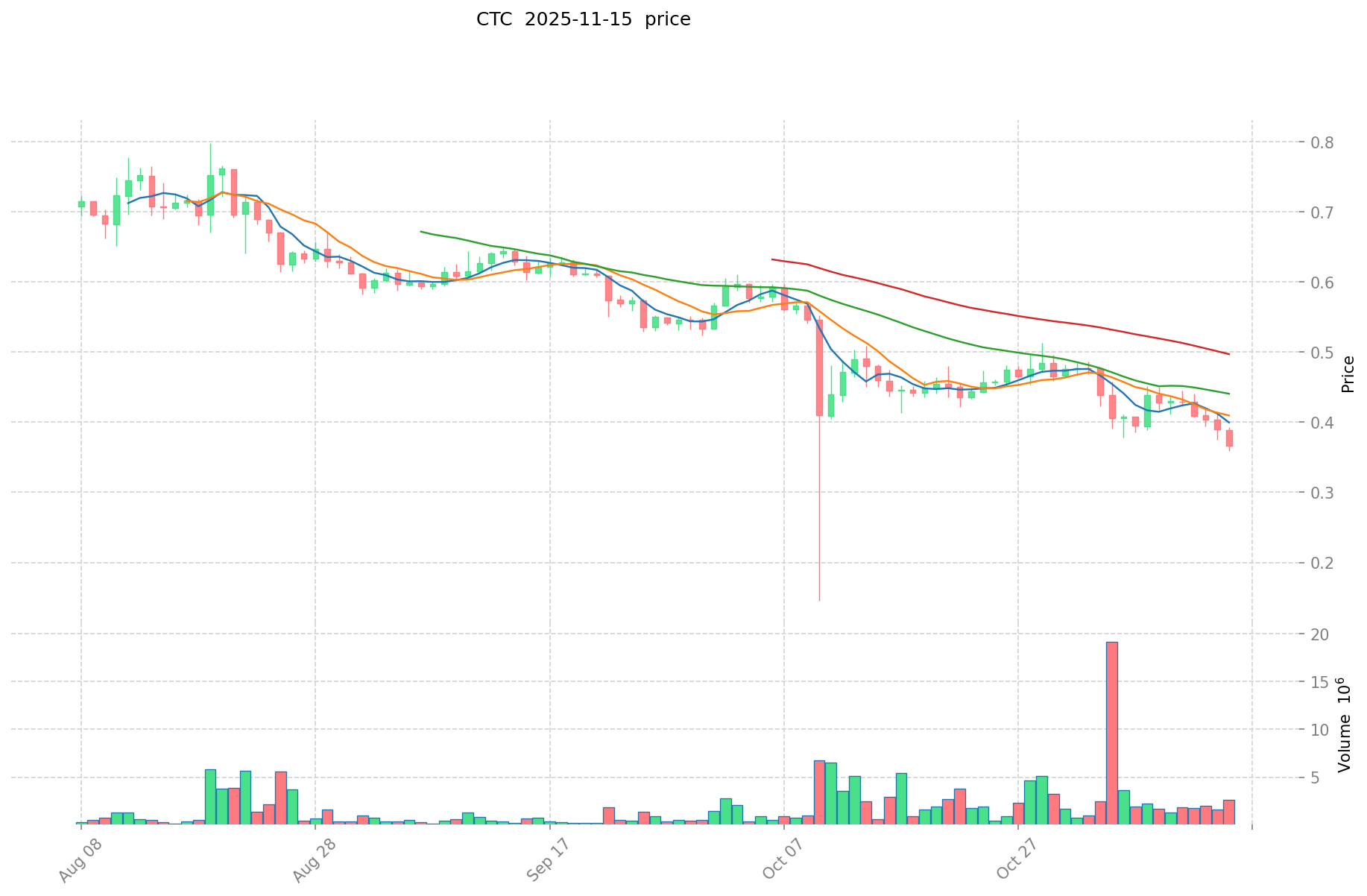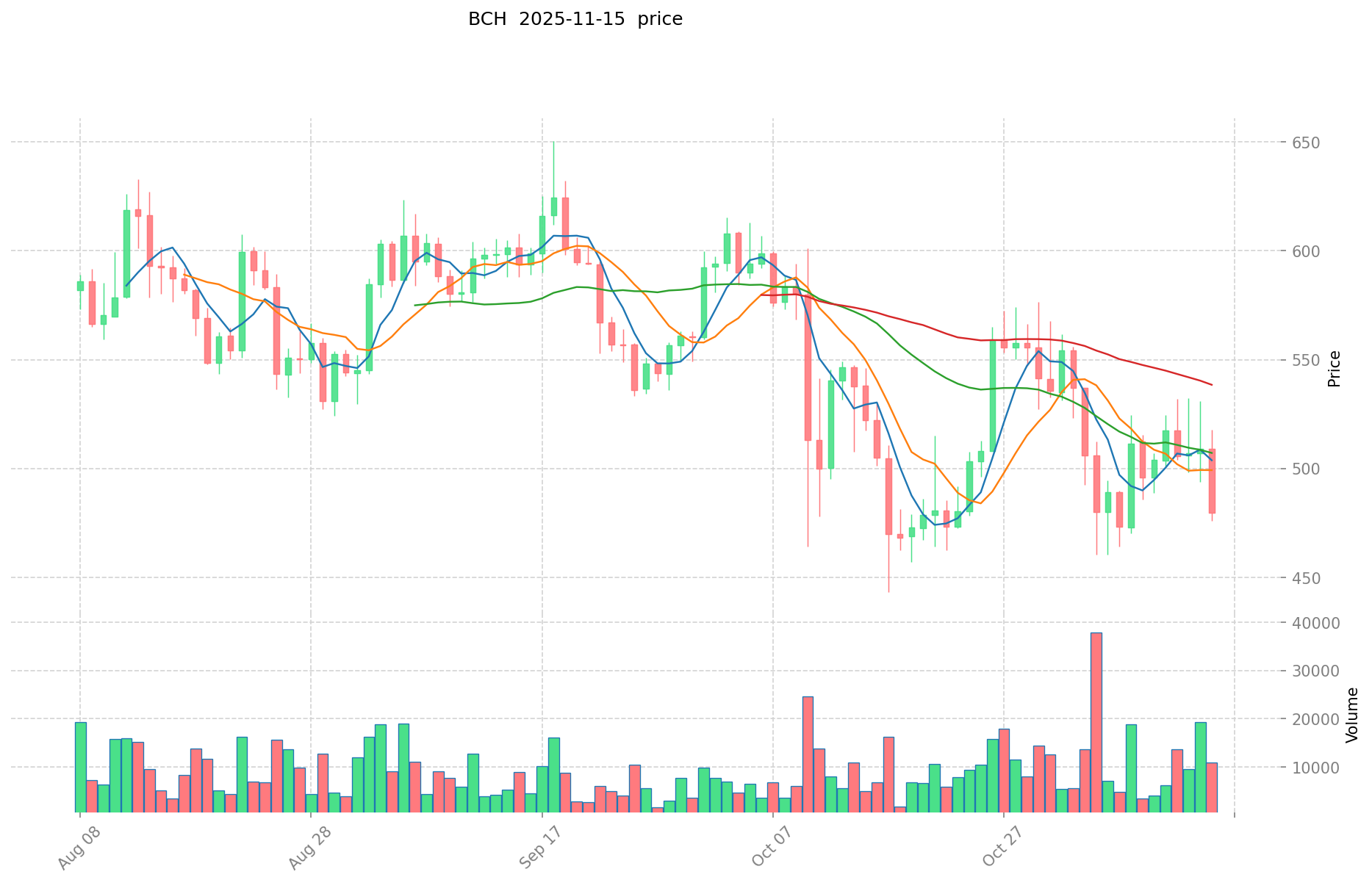CTC vs BCH: Comparing Two Cryptocurrency Payment Solutions for Merchants
Introduction: CTC vs BCH Investment Comparison
In the cryptocurrency market, Creditcoin vs Bitcoin Cash has always been a topic that investors can't avoid. The two not only have significant differences in market cap ranking, application scenarios, and price performance, but also represent different positioning of crypto assets.
Creditcoin (CTC): Since its launch in 2020, it has gained market recognition for its global credit network platform.
Bitcoin Cash (BCH): Since its inception in 2017, it has been hailed as a "peer-to-peer electronic cash system", and is one of the cryptocurrencies with the highest global trading volume and market capitalization.
This article will comprehensively analyze the investment value comparison between CTC and BCH, focusing on historical price trends, supply mechanisms, institutional adoption, technical ecosystems, and future predictions, and attempt to answer the question that investors are most concerned about:
"Which is the better buy right now?"
I. Price History Comparison and Current Market Status
Creditcoin (CTC) and Bitcoin Cash (BCH) Historical Price Trends
- 2023: CTC reached its all-time low of $0.128298 on October 19, 2023.
- 2021: BCH experienced significant volatility, with its all-time high of $3,785.82 recorded on December 20, 2017.
- Comparative analysis: During their respective market cycles, CTC declined from its all-time high of $8.67 to $0.128298, while BCH dropped from $3,785.82 to its all-time low of $76.93.
Current Market Situation (2025-11-16)
- CTC current price: $0.3558
- BCH current price: $502.18
- 24-hour trading volume: CTC $228,422.48 vs BCH $3,616,129.91
- Market Sentiment Index (Fear & Greed Index): 10 (Extreme Fear)
Click to view real-time prices:
- Check CTC current price Market Price
- Check BCH current price Market Price


II. Key Factors Affecting Investment Value of CTC vs BCH
Supply Mechanisms (Tokenomics)
- CTC: Fixed supply model with maximum cap of 21 million tokens, following Bitcoin's original design
- BCH: Fixed supply model with maximum cap of 21 million tokens, featuring the same halving schedule as Bitcoin
- 📌 Historical pattern: Both coins follow similar supply mechanisms to Bitcoin, with the halving events historically creating cyclical price movements as new supply issuance decreases over time.
Institutional Adoption and Market Applications
- Institutional holdings: BCH has longer history of institutional adoption through products like Grayscale's BCH Trust, while CTC is newer and currently has lower institutional presence
- Enterprise adoption: BCH has more established merchant payment networks and remittance services, while CTC is working to build its payment ecosystem
- Regulatory attitudes: Both face similar regulatory frameworks as Bitcoin forks, with BCH having more established status across jurisdictions due to its longer history
Technical Development and Ecosystem Building
- CTC technical development: Focus on implementing the original Bitcoin design principles with emphasis on peer-to-peer electronic cash functionality
- BCH technical development: Regular protocol upgrades with improvements to scaling, smart contracts via CashTokens, and enhanced transaction capabilities
- Ecosystem comparison: BCH has a more developed ecosystem with established DeFi applications, NFT marketplaces, payment processors, and emerging smart contract capabilities through CashTokens, while CTC's ecosystem is in earlier stages of development
Macroeconomic Factors and Market Cycles
- Inflation hedge properties: Both coins present similar hard money characteristics with fixed supply caps, potentially serving as inflation hedges
- Monetary policy effects: Interest rate changes and USD strength impact both coins similarly as part of the broader cryptocurrency market
- Geopolitical factors: Cross-border transaction demand potentially benefits both coins, with BCH having more established international payment corridors currently
III. 2025-2030 Price Prediction: CTC vs BCH
Short-term Prediction (2025)
- CTC: Conservative $0.22-$0.36 | Optimistic $0.36-$0.38
- BCH: Conservative $347-$503 | Optimistic $503-$543
Mid-term Prediction (2027)
- CTC may enter a growth phase, with prices estimated between $0.23-$0.58
- BCH may enter a bullish market, with prices estimated between $309-$805
- Key drivers: Institutional inflows, ETFs, ecosystem development
Long-term Prediction (2030)
- CTC: Base scenario $0.40-$0.66 | Optimistic scenario $0.66-$0.81
- BCH: Base scenario $472-$827 | Optimistic scenario $827-$910
Disclaimer
CTC:
| 年份 | 预测最高价 | 预测平均价格 | 预测最低价 | 涨跌幅 |
|---|---|---|---|---|
| 2025 | 0.381241 | 0.3563 | 0.224469 | 0 |
| 2026 | 0.483089355 | 0.3687705 | 0.35401968 | 3 |
| 2027 | 0.575005402125 | 0.4259299275 | 0.234261460125 | 19 |
| 2028 | 0.61057055107125 | 0.5004676648125 | 0.37034607196125 | 40 |
| 2029 | 0.766616368959787 | 0.555519107941875 | 0.527743152544781 | 56 |
| 2030 | 0.806502640910014 | 0.661067738450831 | 0.403251320455007 | 85 |
BCH:
| 年份 | 预测最高价 | 预测平均价格 | 预测最低价 | 涨跌幅 |
|---|---|---|---|---|
| 2025 | 543.1968 | 502.96 | 347.0424 | 0 |
| 2026 | 643.386432 | 523.0784 | 303.385472 | 4 |
| 2027 | 804.86073408 | 583.232416 | 309.11318048 | 16 |
| 2028 | 874.4986845504 | 694.04657504 | 478.8921367776 | 38 |
| 2029 | 870.542619072672 | 784.2726297952 | 635.260830134112 | 56 |
| 2030 | 910.1483868773296 | 827.407624433936 | 471.62234592734352 | 64 |
IV. Investment Strategy Comparison: CTC vs BCH
Long-term vs Short-term Investment Strategies
- CTC: Suitable for investors focused on credit network potential and ecosystem growth
- BCH: Suitable for investors seeking established payment networks and smart contract capabilities
Risk Management and Asset Allocation
- Conservative investors: CTC: 20% vs BCH: 80%
- Aggressive investors: CTC: 40% vs BCH: 60%
- Hedging tools: Stablecoin allocation, options, cross-currency portfolios
V. Potential Risk Comparison
Market Risk
- CTC: Higher volatility due to lower market cap and trading volume
- BCH: Subject to broader cryptocurrency market trends and Bitcoin price movements
Technical Risk
- CTC: Scalability, network stability
- BCH: Mining centralization, security vulnerabilities
Regulatory Risk
- Global regulatory policies may impact both coins, with BCH potentially facing more scrutiny due to its larger market presence
VI. Conclusion: Which Is the Better Buy?
📌 Investment Value Summary:
- CTC advantages: Newer project with potential for growth, focus on credit network applications
- BCH advantages: Established ecosystem, higher liquidity, smart contract capabilities via CashTokens
✅ Investment Advice:
- New investors: Consider allocating a smaller portion to CTC for potential growth, with a larger allocation to the more established BCH
- Experienced investors: Balanced approach with exposure to both coins, adjusting based on risk tolerance and market conditions
- Institutional investors: Focus on BCH for its higher liquidity and established market presence, while monitoring CTC's development
⚠️ Risk Warning: The cryptocurrency market is highly volatile. This article does not constitute investment advice. None
VII. FAQ
Q1: What are the main differences between CTC and BCH? A: CTC is a newer project focused on building a global credit network platform, while BCH is an established cryptocurrency aimed at being a peer-to-peer electronic cash system. BCH has a larger market cap, higher trading volume, and a more developed ecosystem with DeFi applications and smart contract capabilities.
Q2: Which coin has performed better historically? A: BCH has shown higher price peaks historically, reaching an all-time high of $3,785.82 in December 2017. CTC, being newer, has a shorter price history with its all-time high at $8.67. However, both have experienced significant volatility and price declines from their peaks.
Q3: How do the supply mechanisms of CTC and BCH compare? A: Both CTC and BCH have fixed supply models with a maximum cap of 21 million tokens, similar to Bitcoin. They both follow halving schedules that reduce new supply issuance over time, potentially creating cyclical price movements.
Q4: Which coin has better institutional adoption? A: BCH currently has better institutional adoption due to its longer history and established presence in the market. It has institutional investment products like the Grayscale BCH Trust, while CTC is still in earlier stages of institutional adoption.
Q5: What are the key technical developments for each coin? A: CTC focuses on implementing original Bitcoin design principles with an emphasis on peer-to-peer electronic cash functionality. BCH has regular protocol upgrades, improving scaling, introducing smart contracts via CashTokens, and enhancing transaction capabilities.
Q6: How do the long-term price predictions compare for CTC and BCH? A: By 2030, CTC is predicted to reach between $0.40-$0.81 in various scenarios, while BCH is predicted to reach between $472-$910. These predictions suggest potentially higher percentage gains for CTC, but higher absolute values for BCH.
Q7: What are the main risks associated with investing in CTC and BCH? A: CTC faces higher volatility risk due to its lower market cap and trading volume. BCH is subject to broader cryptocurrency market trends and Bitcoin price movements. Both face technical risks related to scalability and security, as well as regulatory risks that could impact their adoption and use.
Share
Content